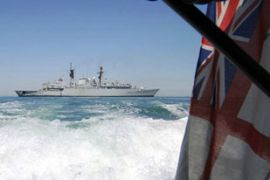Iran-Britain standoff resolved
Timeline of crisis between Iran and Britain over the capture of 15 sailors.

Published On 5 Apr 2007
April 4
-
Mahmoud Ahmadinejad, the Iranian president, pardons the British sailors, and says they are free to go home.
-
The announcement comes at the end of a 45-minute speech by Ahmadinejad in Tehran.
April 3
-
Margaret Beckett, Britain‘s foreign secretary, urges caution over hopes of a “swift resolution”. “We are not seeking confrontation. We are seeking to pursue this through diplomatic channels,” Beckett said.
-
The Roman Catholic bishop of Britain‘s armed forces issues a plea from “one religious leader to another” calling on Iran‘s supreme leader Ayatollah Ali Khamenei to help free the detained sailors.
April 2
-
Iran says there have been “positive changes” in British policy on the standoff.
-
State radio says Tehran has taped “confessions” from all 15 captured sailors that they entered Iranian waters but will not air any more of them.
-
Previously unseen footage of some of the crew members are later aired but without audio.
-
London says two countries have agreed to discuss prevention of future similar disputes.
-
Ali Larijani, Iran’s chief negotiator, says Iran wants a diplomatic solution and that there is no need to put the 15 on trial.
April 1
-
The UK calls “unacceptable” Iranian footage of two of the crew members separately “confessing” to being in Iranian waters when they were captured.
-
Iranian protesters throw petrol bombs, firecrackers and stones at the British embassy in Tehran.
-
Manouchehr Mottaki, the Iranian foreign minister, says Tehran is waiting for a “change in attitude” from Britain.
March 31
-
Mahmoud Ahmadinejad, the Iranian president, criticises Britain’s response to the crisis and calls Britain “arrogant” for not apologising.
-
George Bush, the US president, criticises Iran’s seizure of the 15, calling them “hostages”, and backs the British government stance that there will be no “quid pro quos”.
-
Gholamreza Ansari, Iran’s ambassador to Moscow, says legal process started against the 15 but later denies reports quoting him as saying they would face trial.
March 30
-
Iran airs interview with Nathan Summers, a captured crew member, who apologises for “trespassing” in Iranian waters.
-
Releases a letter allegedly from Faye Turney in which she says she has been “sacrificed” to the policies of the British and American governments.
-
Iran sends British embassy in Tehran formal note condemning the “illegal act” and demanding guarantees against “the recurrence of such acts”.
March 29
-
Britain fails to win support from the UN Security Council for a strong statement to “deplore” Iran’s actions.
- Council agrees on watered-down statement expressing “grave concern” and calling for an early resolution of the problem, including the Britons’ release.
- A senior Iranian official says the sailors may be put on trial.
- Tony Blair, the British prime minister, rejects any “quid pro quo or tit-for-tat” negotiation over hostages.
- Tehran presents video purportedly showing capture of naval personnel in Iranian waters.
- Iranian state television reports Turkey urging Iran to allow Turkish diplomatic access to the seized troops and to free the lone female sailor.
March 28
-
Tehran says it will allow visits to seized sailors but says UK must “admit mistake” to end the crisis.
-
Britain suspends official contact with Iran and Tony Blair, the prime minister, pledges to “ratchet up” pressure on Iran.
-
Tehran first says it will release Faye Turney, the only woman sailor held, on Wednesday or Thursday, then changes it to “as soon as possible”.
-
Britain releases GPS (global positioning system) evidence to prove the group was 1.7 nautical miles inside Iraqi waters when seized.
-
Iranian television footage of the sailors and marines shows Turney saying “Obviously we trespassed in the [Iranian] waters”.
-
Iranian authorities release a letter they say was written by Turney, 26, to her family in which she purportedly said she had apologised to the Iranians for trespassing.
-
Britain condemns Iran for publishing the letter and for airing the footage, raising concerns about possible coercion.
-
Britain produces a draft seeking UN Security Council endorsement to “deplore” Iran’s actions.
March 27
-
Britain warns Iran of tensions escalating to a “different phase” if the standoff remains unresolved through diplomatic channels.
March 26
-
Iran denies the 15 were taken in exchange for Iranians held by the US in Iraq, saying they will have to answer allegations of illegal entry.
March 25
-
Tony Blair says the seizure is “serious” and wants the “unjustified and wrong” detention to end quickly.
-
Britain’s ambassador to Iran demands to meet the 15, and calls for their immediate release.
March 24
-
The 15 sailors and marines, including one woman, are transferred to Tehran for questioning, an Iranian news agency reports.
-
Iranian authorities say navigational equipment from the seized frigate will prove the illegal entry.
-
Iran’s military spokesman says the British service personnel admit to violating its territorial waters and rejects London’s demands for their swift release.
March 23
-
Britain’s defence ministry announces the capture of 15 sailors and marines from HMS Cornwall at gunpoint by the Iranian navy.
-
Iran says border guards arrested them after finding them entering illegally into its waters, but the UK says the group was well within Iraqi territory.
-
Iran’s ambassador in London and British diplomats in Tehran are summoned for talks.
-
Margaret Beckett, Britain’s foreign secretary, demands a “complete explanation” from Tehran.
Source: News Agencies